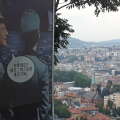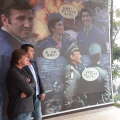The Frontier Café – Conversation with Elma Tataragić
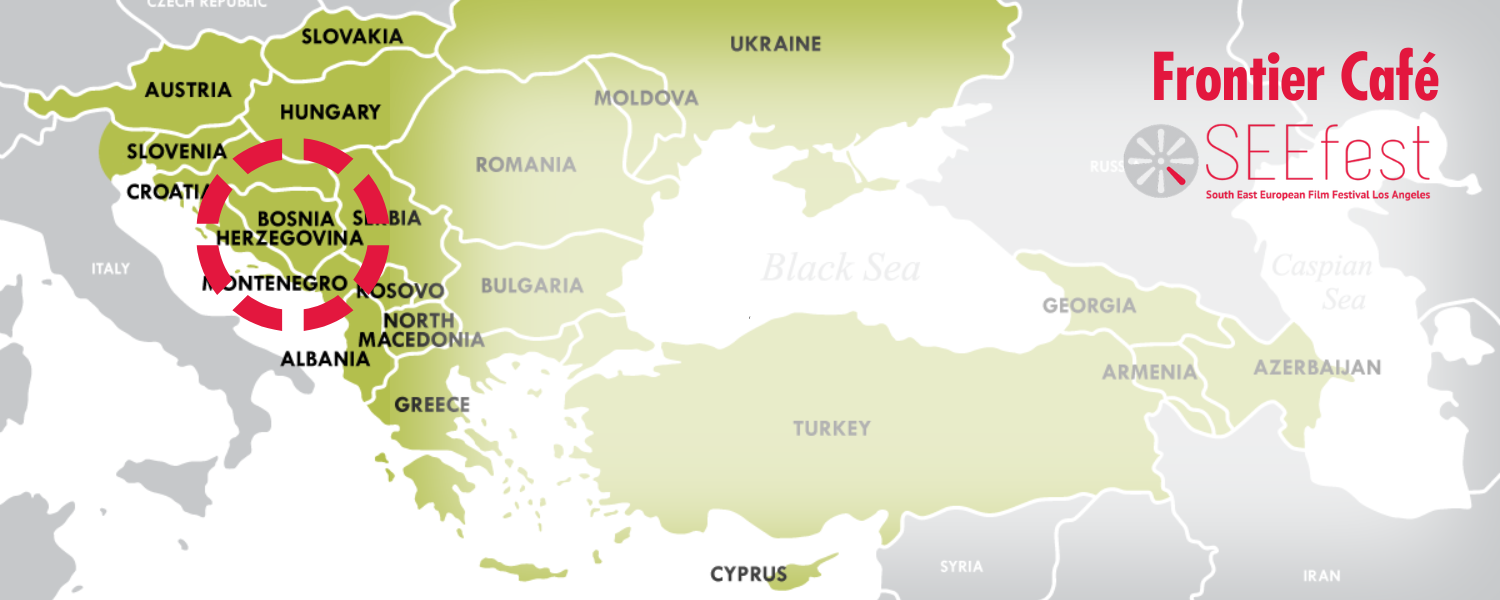
The History of Bosnian Cinema and the Role of Memory in Cinema
Please subscribe to our new podcast. Available on Anchor, Spotify, Amazon Music, Google Podcast, Castbox, Pocket Cast, Radio Public, YouTube
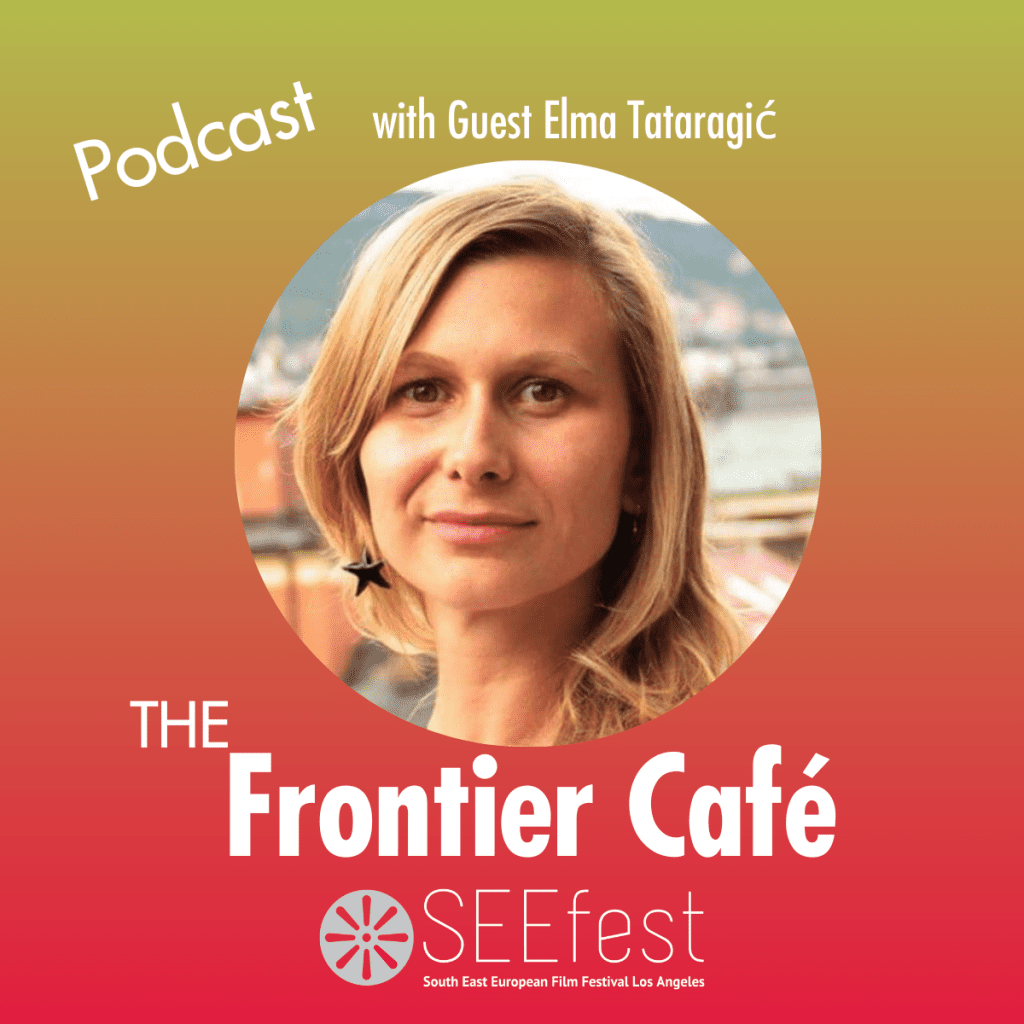
This episode features a conversation with Elma Tataragić. Elma currently works as a selector for the Competition Program for the Sarajevo Film Festival and is the President of the Filmmakers Association of Bosnia and Herzegovina. During our talk, we touched upon the history of Bosnian cinema, her work with film students, and the role of memory in film. Please enjoy our conversation demonstrating the untapped potential of films and their impact on local and global communities!
NOTE: The language spoken in this interview is Bosnian/Croatian/Serbian (link to English translation or watch on YouTube with English captions)
About The Guest
Elma Tataragić (1976) is a scriptwriter, professor and festival programmer. She graduated Dramaturgy (Screenwriting and History of Cinema) at Sarajevo Academy of Performing Arts and obtained her Master of Science degree and PhD in Film and Literature. She has been with Sarajevo Film Festival since it was founded in 1995, where she now works as selector for Competition Programs and CineLink Industry Days.
She co-wrote short film First Death Experience (2001) and wrote and produced short North Went Mad (2003), both directed by Aida Begić. She has produced and co-written the feature film Snow (2008) also directed by A. Begić, shown in the Semaine de la critique at Cannes Film Festival 2008, where the film won the Grand Prix. The film has been shown at over 80 festivals and won over 30 international awards. She is the General Secretary and a member of Filmmakers Association of Bosnia and Herzegovina. She has been teaching screenwriting at Sarajevo Academy of Performing Arts since 2002, now as a professor.
She is member of European Film Academy and has published a book on screenwriting and is also works as a script consultant. In 2016 she has completed her short fiction film I Remember, which is successfully touring the world film festivals. The feature film When The Day Had No Name (2017) directed by Teona Mitevska which she has co-written premiered in Panorama Special at Berlinale 2017. She is currently in preproduction of two feature films she has written: Stitches to be directed by Serbia director Miroslav Terzić and God Exists And Her Name Is Petrunija by Macedonian director Teona Mitevska. She’s also developing a new feature and short experimental films.
Connect with Elma on Social
SUPPORT SEEFEST
Not a member yet? Become an art patron with other SEEfest arthouse aficionados in support of great events and programs, as well as our mission to keep you informed about initiatives from our wide network of fellow cultural organizations.
We Welcome YOU!
The Academy Announces 87 Foreign Films Competing for Award
The Academy of Motion Picture Arts and Sciences announced the 87 films from South-east Europe and around the world that will be competing this year for the Best Foreign Language Film award. Nominations for the 91st Academy Awards will be announced on January 22, 2019. The ceremony will take place on February 24, 2019.
Below are this year’s submission from all the South-East European countries (and more!):
Belarus was the first country to announce its submission this year with Darya Zhuk’s drama Crystal Swan. Set in the 1990’s, a peripatetic young DJ is derailed by a typo in a forged US Visa application, forcing her to a backwater village where she is determined to fake her way to the American dream. This will mark the third Belarusian submission so far.
Bosnia and Herzegovina has selected the drama Never Leave Me directed by Aida Begić. This co-production with Turkey tells the story of three displaced Syrian boys living a difficult life as refugees in the magical, mythical Turkish city of Sanliurfa. Searching for recovery from a traumatic past, the children cross the path from destructiveness and hostility to meaningful existence and love. Bosnia won this category in 2001 with Danis Tanović’s No Man’s Land.
Bulgaria has chosen Ilian Djevelekov’s Omnipresent. The film’s protagonist is Emil, a writer and owner of an advertising agency who gradually becomes obsessed with spying on his family, friends and employees with hidden cameras. In October 2017, this feature triumphed at Bulgaria’s Golden Rose film festival, winning Best Film, Best Actor and Actress, as well as the Audience Award categories. In 2009, Stephan Komandarev’s The World is Big and Salvation Lurks Around the Corner made the shortlist but was not nominated.
Croatia will be represented by Ivan Salaj’s political comedy drama The Eighth Commissioner. It tells the story of an ambitious politician caught in a scandal and exiled to a remote island to keep him out of the public eye. There, he is tasked with organizing local elections – something his seven predecessors have failed to accomplish… Croatia has never been nominated in this category in the past.
Czech Republic has chosen Olmo Omerzu’s road-trip comedy Winter Flies. The story follows two mischievous adolescent boys who embark on a journey of misadventure and self-discovery. This film made its worldwide debut in July at the Karlovy Vary International Film Festival, where it won the Best Director category. Czech Republic has been nominated three times for the foreign language category, and won in 1996 with Jan Svěrák’s Kolya.
Estonia has selected Take It or Leave It directed by Liina Triškina-Vanhatalo. The film tackles themes of responsibility, single parenthood, and economic inequality. It tells the story of a 30-year-old construction worker who suddenly becomes a single parent when his ex-girlfriend delivers a baby girl, and informs him that she’ll put the child up for adoption unless he wants to take care of her. This is the third time Estonia has chosen a movie from producer Ivo Felt, whose 2014 Tangerines directed by Zaza Urushadze received the country’s only nomination.
Georgia has chosen Namme directed by Zaza Khalvashi. This lyrical feature had its international premiere at the Tokyo Film Festival. It is the story of a family determined to protect an ancient and venerated water source at all costs. Set in an idyllic rural location where Muslims and Christians live peacefully side by side, the ancient healing qualities of the water are threatened by the construction of a hydroelectric power station, which is blamed for the loss of the spring waters. Giorgi Ovashvili’s Corn Island made the shortlist in 2014 but was not nominated.
Greece will compete with writer-director Dora Masklavanou’s period drama Polyxeni. Set in 1955, the film centers on an orphaned 12-year-old girl, who embarks on a new life following her adoption by a prominent couple, seemingly unaware of devious designs on her large inheritance. Greece has been nominated five times for this category, with its most recent nomination for Yorgos Lanthimos’s 2010 feature Dogtooth (which lost out to Denmark’s In a Better Worlddirected by Susanne Bier).
Hungary has selected Sunset directed by László Nemes, which won the International Federation of Film Critics award at the 75th Venice International Film Festival. Set in Budapest on the eve of World War I, the film follows a young woman who arrives from Trieste looking for work at the elegant hat store once owned by her parents. Rebuffed by the shop’s current owner, she is drawn into a mystery surrounding her long-lost brother. Nemes won the Oscar in this category for the Holocaust drama Son of Saul in 2016, marking Hungary’s second win after István Szabó’s Mephisto in 1982.
Kosovo has chosen Blerta Zeqiri’s debut feature The Marriage. The romantic drama focuses on the experience of a bride, unaware that the man she is about to marry is still in love with his best friend. It marks only the fifth year Kosovo has entered the race for an Academy Award, and the first time the country has submitted a film by a female filmmaker.
Macedonia has submitted Gjorce Stavreski’s Secret Ingredient for consideration. In this dramedy, an underpaid train mechanic gives his father a cake made of stolen marijuana to relieve his cancer pain. However, he is soon cornered by criminals searching for their drugs and the nosy neighbors who want a recipe for the mysterious “healing” cake. In 1995, Macedonia earned a nomination with Milcho Manchevski’s Before the Rain, but lost out to Russia’s Burnt by the Sun directed by Nikita Mikhalkov.
Montenegro is sending Gojko Berkuljan’s Iskra. This thriller follows a retired detective whose life is interrupted when his daughter disappears, and his investigation leads him back to his past. It marks only the fifth time Montenegro has competed in this category, and has yet to secure a nomination.
Romania will be represented by Radu Jude’s I Do Not Care If We Go Down in History as Barbarians. The film won the Crystal Globe for best film at the Karlovy Vary Film Festival. Set in present-day Romania, the film centers on a stage director preparing to mount a monumental historical re-enactment of an episode from the Holocaust: the massacre of tens of thousands of Jews by Romanian troops in Odessa. The title refers to an actual quote from a Romanian government minister in 1941. The director battles against official unease about the allegedly unpatriotic nature of the play, the trivialization of horrific historical events, and a revival of nationalist fervor in the country. Romania made the shortlist in 2012 with Cristian Mungiu’s Beyond the Hills but was not nominated.
Serbia will compete with Dejan Zečević’s Offenders. This thriller centers on three university students, who set up experiments around the city to prove the “Tetris” theory of chaos. Under that theory, human nature inevitably deteriorates from order to anarchy… Srdan Golubović’s thriller The Trap made the shortlist in 2008 but was not nominated.
Slovakia has selected The Interpreter directed by Martin Šulík as its entry. It tells the story of an 80-year-old man who finds a book by a former SS officer detailing his activities in Slovakia during World War II. Realizing that his parents were executed by the officer, he sets out to get his revenge but instead meets the officer’s 70-year-old son (Toni Erdmann star Peter Simonischek), who hardly knew his father. With the officer’s son acting as interpreter, the two men embark on a journey of discovery of the past and their own identity. Slovakia has not been previously nominated.
Slovenia has chosen Ivan, directed by Janez Burger (Silent Sonata). The film focuses on Mara, a young woman caught in a violent corruption affair and forced to make an impossible choice between the man she obsessively loves and her newborn son, Ivan. In September 2017, the film swept the Slovenian Film Festival, taking eight prizes, including Best Film, Best Screenplay, Best Cinematography, and Best Actress.
Slovenia has not been previously nominated.
Turkey’s contender will be Nuri Bilge Ceylan’s The Wild Pear Tree. This feature, which premiered in competition in May at Cannes, is Turkey’s fifth submission directed by Ceylan. The film tells the story of an aspiring writer who returns to his native village, where he pours his heart and soul into scraping together the money he needs to be published, only for his father’s debts to catch up with him. Ceylan’s Three Monkeys made the shortlist in 2008 but was not nominated.
Author:
Georges Aintablian is a Los Angeles based international film critic. He has been following Academy submissions for the last 20 years, and has a special interest in French films, Latin American Cinema (especially Mexico and Brazil), Middle Eastern films, and Asian Cinema (especially South Korea, China, and Japan). Georges speaks 8 languages, and writes about World Cinema and major film festivals in L.A. on his blog Cinémaniaque Films.
See his profile on Letterboxd.
WWII Resistance Hero Immortalized in Iconic Film gets Museum in Sarajevo
During the recent Sarajevo Film Festival (sff.ba) Bosnian Film Center announced plans for a new Museum dedicated to the legendary film about the WWII resistance hero, Vladimir Peric, popularly known by his undercover name Walter. He was killed in the final battle for Sarajevo against the Nazi occupying forces in April 1945.
There is a unique cinematic connection to Walter. Quarter century ago Bosnian and Yugoslav director Hajrudin “Siba” Krvavac made the iconic film Walter defends Sarajevo, the third in his trilogy of WWII movies about partisan resistance fighters. Walter has since gained a cult status even in China (“Some 1.3 billion people now live in China and half of them have seen Walter Defends Sarajevo,”) as well as a reference point for defiant Sarajevans during the siege of the city in the 1990s. The closing line of the film, spoken by a Nazi officer looking down on the city from the hillside vintage point, “Das ist Walter,” (“This is Walter”) has become the defining moment to characterize Sarajevo as the city that will always stand tall in face of aggression and injustice.
Jasmin Durakovic, filmmaker and director of the Bosnian Film Center was joined by Alen Cengic, owner of the Park of the Princes restaurant where the press conference about the Museum was held – at the very spot where the iconic ending of the film took place. “Walter Defends Sarajevo has attained the status of a cult achievement of our cinema,” said Durakovic. “This film is one of the few widely recognized and uniquely Sarajevan reference points which is why the Sarajevo Film Center has decided to create the Museum dedicated to the film.”
The Walter Museum is expected to be completed in two months and will be located in the Film Center’s building (former Sutjeska Film Studio) in downtown Sarajevo. On the site of Park of the Princes restaurant overlooking the city a giant mural backdrop commemorates some of the scenes from the film – with Chinese subtitles. Even before the media event was over groups of Chinese tourists flocked to the site and started taking photographs. Young couples with children instantly recognized the imagery from the beloved film of their parents’ generation and enthusiastically confirmed that Walter still holds his immortal cinematic place in the hearts of the Chinese people. Bathed in the afternoon light the city of Sarajevo was lying below, its spirited citizenry in the party mood for the film festival. Yet quiet echoes of the legendary film live on in Sarajevo where one line of a movie dialogue forever defined its unconquered spirit. After all this is not an ordinary city. Das ist Walter.
- “Walter Defends Sarajevo” poster in China
Editor’s note:
Hajrudin “Siba” Krvavac (1926 – 1992) is best known for his hugely popular trilogy of war movies about WWII partisans whose heroic resistance became the stuff of legends: The Demolition Squad (Diverzanti, 1967), The Bridge (Most, 1969) and Walter Defends Sarajevo (Valter brani Sarajevo, 1972). Krvavac was also a well known documentary director. He was among the internationally acclaimed Bosnian filmmakers whose movies made the name of the production company Sutjeska Film Sarajevo known well beyond the country’s borders. He died in July 1992 during the Siege of Sarajevo. “However, Krvavac lived long enough to see the people of Sarajevo in 1992 chant, “We Are Walter!” in protest of the conflict.” (wiki)
Mindset that knows no borders: Interview with Otto Banovits
Online cultural magazine Transatlantic Panorama (TAP) has just published an interview with film director Otto Banovits, whose short film Donkey Xote won Best Short Film Award at SEEfest 2017. He talks about his migratory life that took him from Sweden to Hungary to England and Los Angeles, and how this journey informed his work – and his mindset that knows no borders. Interviewed by Bettina Botos, publisher of TAP, Banovits touches upon many themes including, among others, form vs. content, quotes Hungarian writer István Eörsi, and references the 2016 Oscar-winning film Son of Saul by László Nemes when talking about the fate of refugees. You can read the entire interview here.
Gyula Gazdag receives Lifetime Achievement Award in Budapest
We are delighted to share with SEEfest fans the news from Budapest where our festival’s long time friend and renowned filmmaker, educator and mentor Gyula Gazdag was honored at the Budapest International Documentary Festival with the Lifetime Achievement Award. Congratulations!
Gyula Gazdag is a professor at UCLA School of Theater, Film and Television. He has served as the Artistic Director of the Sundance Filmmakers Lab since 1997. Gazdag has been a creative advisor at the Maurits Binger Film Institute in Amsterdam since 2002, and at the Script Station of the Berlinale Talent Campus since 2006. Daily Variety selected him as one of the ten best film teachers of 2011. His numerous feature films include A Hungarian Fairy Tale, winner of Best Feature Film of the Year of the Hungarian Film Critics and screened at Cannes Directors’ Fortnight, Stand Off, winner of a Special Jury Prize at the San Sebastian Festival, Lost Illusions, winner of Best Screenplay at the Hungarian Film Week, Swap, Singing on the Treadmill, which was banned in Hungary for 10 years, and The Whistling Cobblestone, which was banned from foreign exhibition for 12 years. His documentary work includes The Banquet, Package Tour and The Resolution, which was named one of the 100 best documentaries of all time by the International Documentary Association, and The Selection.The latter two were also banned in Communist Hungary for more than a decade.
SEEfest was honored to have Gyula Gazdag on the jury for Best Documentary Film, and as festival advisor and cultural ambassador. Most recently SEEfest presented Gazdag’s influential documentary, Package Tour at the Los Angeles Museum of the Holocaust in November 2017.
Interview with producer Dorothea Paschalidou (Worlds Apart)
By Anna Spyrou –
Dorothea Paschalidou, producer of Worlds Apart, written/directed by Christopher Papakaliatis, and starring J.K. Simmons, spoke to SEEfest about the movie and her producing career in Los Angeles.
SEEfest: Can you tell us a little about yourself and how you got involved in the film industry?
Dorothea: I was born in Athens, Greece. I was raised in an artistic environment as my mom is an art dealer, and my dad is a landscaper. I have an eye for art and I like to support artists and their vision. So, that’s how I got involved in the world of cinema.
SEEfest: What brought you to Los Angeles?
Dorothea: I always wanted to come here; it’s the mecca of the film industry. I studied Media Arts at the Royal Holloway University of London, and then I took my masters degree at the University of Southern California, specifically at the Peter Stark Producing Program. During that time, I worked as an intern for Alexander Payne’s production company. I was doing development work for them and I fell in love with development. Afterwards, I moved to 20th Century Fox Studios as the executive assistant to the Chairman & CEO of the studio.
SEEfest: When do you know a script is ready to produce?
Dorothea: Well I don’t, (is my) straightforward answer (she laughs). When the story is there then it’s ready to go out. Story is the king. A script is not producible when it’s not contained.
SEEfest: What is your process of getting the script produced?
Dorothea: The starting point and most important element is the team. Entering the production process is like entering a marriage, but instead of one person, there are a lot of people you need to “get in bed with”. You should set your boundaries, balance and trust your team. So the process is getting your project together and then you take it from there, the journey begins.
SEEfest: What first attracted you while reading the script for Worlds Apart?
Dorothea: I loved it immediately. I love how the three different stories/worlds, seemingly unrelated, weaved together and intertwined to connect in the end, creating this great narrative about love, politics, and everything human.
SEEfest: How did you get in touch with J.K. Simmons?
Dorothea: I had attached the senior producer Chris Papavasiliou based in New York to Worlds Apart. He knew J.K.’s manager, Stephen Hirsch, and he sent him the script. J.K. has just completed Whiplash (big hit at Sundance). He read the script and loved it. “That’s the role I was looking for, a romantic character who appeals to an older demographic” he said. So he was in, just like that.
SEEfest: What was his stand as American towards the social economic turmoil in Southeast Europe?
Dorothea: From his interviews and what we’ve talked about, I know J. K. is a very sensitive person. He is concerned about the situation and how it creeps up and affects his country and other countries around the world.
SEEfest: Was it easy to release the film in the United States?
Dorothea: It was a challenge at first. Of course, J.K.’s role was vital. That made things easier, but nonetheless it is a foreign language film in a foreign country. The journey is never easy for such movies, but we were very lucky and found a distributor here, Cinema Libre. Cinema Libre brought it over from Europe, what we called ‘Platform Release’. We went from city to city – from New York, where the film was very well received and played for multiple weeks, to Hollywood, then to Chicago, and the journey continues. We do it city-by-city, country-by-country, step-by-step.
SEEfest: How was the American audience’s reaction at Arclight Hollywood screening?
Dorothea: Actually, they were ecstatic about it. I was very impressed and proud to see how in Q&A’s they were asking questions, and they were saying how much they loved it, and how they fell in love with the characters. As a matter of fact, we had this really funny lady who raised the hand during the Q&A and she said: “ You know what, I brought my first time date here and we kissed during the movie. Thank you for that”. That was very touching and exactly the effect you want to have as a storyteller.
SEEfest: We get noticed because of our successes, but we create them on the back of our failures. What failures (of your own) have you been able to learn from? How did they change you and your process?
Dorothea: The only “failure” career-wise that I can think of was my time in a production company when I worked under a very unhealthy environment, but I don’t want to consider it a failure. I learned a lot of things such as how to stand up for myself and when it is time to walk away. Right after, I found my first Creative Executive job at Hyperion Media, which was a great experience, and after that I went back on set to work as the Talent Supervisor for a show with Peter Stormare and Keanu Reeves called Swedish Dicks. So, I’d say it was a failure turned to success.
SEEfest: Are you on social media and do you use it in your work? Why or why not?
Dorothea: Social media is very important nowadays, but I’m not obsessed with it. My life is not revolving around it. However, I do recognize how important it is to promoting your work, getting things out to the world. People use it every three seconds, if not more often. It’s the best and cheapest way to get yourself out (there) or your work or whatever it is you do.
SEEfest: What role have film festivals played in your life so far? Why are they necessary?
Dorothea: I have not been very well acquainted with the film festivals. I have submitted short films and obviously our feature Worlds Apart to multiple festivals around the world. They are very important especially for younger filmmakers to get their work out there, to get noticed, to network, and get introduced to key people who can help them with their career. A lot of careers have been made through film festivals. They are definitely an important vehicle. I’m happy to attend as many as I can because I can see works of people that otherwise I wouldn’t be able to.
SEEfest: What do audiences want nowadays?
Dorothea: This is the one million dollar question, isn’t it? I don’t know what exactly they want at all times. I know they want a good story. They want to relate to the characters, to follow their journey, to fall in love, to escape, to get heartbroken the same way the characters do on screen.
SEEfest: If there is one or more things you think would make the film industry better, what would it be?
Dorothea: It definitely needs more diverse stories and voices. People want to know about unique stories.
SEEfest: We are all here presumably because we love cinema. How did your love for movies get sparked and what can we, as a Southeast European community, do to help others discover a similar pleasure?
Dorothea: My love for movies started when I was a little girl. I always loved spectacle. Everything was related to cinema. I knew I didn’t have a natural talent for directing, and I was never interested in it either. But I believe I am good enough to detect talent and good story, and help the person who has a vision to bring it to fruition. My role is completely supportive and completely accommodating.
The role of SEEfest is very important because it bridges the gap between Southeast Europe and here, an ocean apart. I think as European filmmakers we are sitting in a goldmine of ideas. We can educate with our history, as well entertain with our personal stories from our cultural background.
SEEfest: Do you have a project in the works right now? Would you share some details about it?
Dorothea: As a producer, I always have projects in the works. I read a massive amount of screenplays, stories, decks, and presentations. So, 50% of these are projects that interest me. I do have a few projects but they are still in very early stages. In a couple of months, I’ll be able to talk more about them.
SEEfest: What words of wisdom would you share with a filmmaker just starting out?
Dorothea: The only thing that I have to tell them is: listen, be aware, write your own story, and make it as unique as possible. Make it yours.
__________________________________________________________________________________________________________
Anna Spyrou is an award winning writer-director passionate about storytelling and living in Los Angeles. She has been involved with SEEfest social media team since 2016.
Watch SEEfest movies online
Take advantage of one more week to watch the latest movies online. We partnered with Films2C to bring a great selection of this year’s festival films straight to your home. The selection includes features, documentaries and shorts – short fiction, short docs and animation shorts. Check out award winners and discover new, talented filmmakers. SEEfest films are available online for rental VOD, but only until June 3rd! Don’t miss out! Go to SEEfest on VOD and enjoy the wonderful selection of 2017 festival films. And please, send us your reviews and recommendations and post them on SEEfest facebook page (and while you’re there, please like and follow our page!) THANKS from all of us at SEEfest!
You can also catch online two acclaimed 2016 SEEfest films: Losers, an award-winning and irresistibly charming satire from Bulgaria; and Turkish unusual romance between two misfits, The Half.
Love movies? Become a Cine-Fan and engage with other SEEfest members, make new friends and join the journey of cinematic and cultural discovery.
Annual General Membership is $55. Student membership is $30. Click here to join today.
Whether you are a professional in the film industry, a student of the arts, or a lover of foreign films, SEEfest is your cultural connection and bridge to discover the lands, people, arts and history of the countries at the crossroads of South East Europe. With Cine-Fan membership program you will be the first to learn about upcoming programs and opportunities to shape them. Join today, and thanks!
On “Defending Cinema in Los Angeles”, the Manifesto of Locarno in L.A.
Los Angeles, 22 April 2017 — Opening night of the inaugural Locarno in Los Angeles film festival at Downtown Independent needs to be recognized for its bold effort to rescue the city from the non-stop, wall-to-wall, suffocating onslaught of ever more commercial glut. We desperately need a revolution of our mental eating habits saturated with the sugary drinks of 80% CGI sprinkled with faux sentimentality that treats us as unsuspecting kindergarteners, an easy prey for inducing a life-long addiction to nonsense.
Los Angeles is at the cutting edge of the 21st century artistic frontier in many creative disciplines and we deserve better in cinema too. This is not a question of “liking” a film. It is healthy to dislike, to critique, to shout at the programmer who put you through the rigmarole of watching “slow film” that is so opaque that it makes you angry – and that provokes you to express your opinion and engage in a heated discussion with your next-seat neighbor, perhaps a nerdy cinephile who drives you crazy with haughty references to movies you have never seen or heard of. It is healthy! As it was healthy when the LA Phil embarked in 1992 on a bold adventure with the young conductor Esa Pekka-Salonen who pushed the orchestra, as well as the audience and sponsors, to experience avant-garde programming with contemporary, experimental, innovative composers. Today LA Phil is the envy of the music world, and a world-class orchestra.
Avant-garde gives new life to everything, even the standard, run-of-the-mill programs. We need cinema that will challenge us, enrage, puzzle and delight in ways we didn’t even know we could be stimulated. It gives health-food nourishment to our poor aneurism-clogged brains and nudges our cerebral power plant to awake from the stupor of the tiresome new age and science-averse pretentious spirituality. We need it to jolt us to a state of wonder by bringing bold cinema to our Hollywood shores.
Vera Mijojlic
Artistic Director of SEEfest
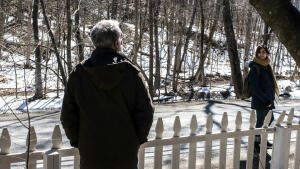
Two SEE films on the LoLA program on Sunday, 4/23: All the Cities of the North, with Serbian director Dane Komljen in person; and Scarred Hearts, by Romanian director Radu Jude.
Locarno in L.A. web site
We invite you to join us NEXT WEEK at the 12th edition of SEEfest, April 27 – May 4. Buy your festival pass today!
*NOTE: SEEfest Cine-Fan Members get a 20% discount on Festival Passes and tickets. Click here to join and get your promo code.
Two SEE films at Locarno in Los Angeles – April 21-23
We are proud that out of 10 films specially selected for the inaugural presentation in Los Angeles of the 69th Locarno Film Festival two are by SEE filmmakers: All the Cities of the North (Serbia / Bosnia Herzegovina / Montenegro) by Dane Komljen, who will attend the screening on April 23 at 6PM; and Scarred Hearts by Radu Jude (Romania), also screening on April 23, at 8:30PM.
A collaboration between Acropolis Cinema, the Locarno Festival, and the Swiss Consulate General of Los Angeles, the inaugural edition of Locarno in Los Angeles will run from April 21-23 at the Downtown Independent cinema.
For full line up of films and tickets please visit Locarno in Los Angeles web site.
IMPORTANT REMINDER: SEEfest 2017 opens on April 27 at the Writers Guild Theater – get your festival pass now! We have eight days of screenings, panels, events, parties, and special guests.
Southeast European Animation Day – March 25 at East L.A. College
SEEfest has partnered with East Los Angeles College and Cinema Without Borders to present on Saturday, March 25 the Southeast European Animation Day.
Join us for a day of delightfully entertaining animated shorts and chat with well-known animation experts.
FREE event. RSVP: [email protected] or call 310 422 4629.
WHEN: Saturday, March 25th, from 11:30am – 3:00PM
WHERE: East Los Angeles College, Music Recital Hall theater (Building S2)
1301 Avenida Cesar Chavez, Monterey Park, CA 91754.
PARKING: Free parking in Structure #3 (off of Avenida Cesar Chavez) or Structure #4 (corner of Floral and Collegiate Avenues)
For details about the program check this article on Cinema Without Borders portal
IMPORTANT REMINDER: Get your festival pass for SEEfest 2017, opening April 27 at the Writers Guild Theater! We have eight days of screenings, panels, events, parties, and special guests. Book your 8-Day Full Access Festival PASS here.







